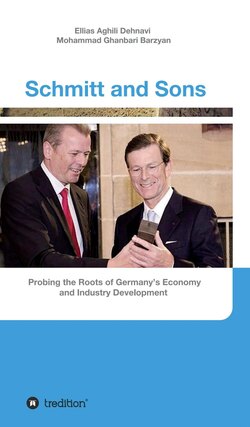Читать книгу Schmitt and Sons - Ellias Aghili Dehnavi - Страница 7
ОглавлениеPreface
The German economy is a highly developed social market economy. This country has the biggest economy in Europe, the fourth biggest economy in the world based on nominal GDP, and the world’s fifth biggest economy based on GDP (purchase power parity). According to the IMF, Germany held 28% of the Eurozone economy in 2017. Germany is a founder member of the EU and Eurozone.
Germany held the record of the biggest global trade surplus worth of 310 billion dollars which made the country one of biggest exporters in the world, and its goods and services exports was 1448.17 billion dollars in 2017. The service sector, industry, and agriculture hold 70, 29.1, and 0.9 percent of the total share of Germany’s GDP, respectively. Exports of Germany encompasses 41% of its national output. Germany’s top 10 exported good are vehicles, machinery, chemical products, electronic products, electric tools, medical products, transportation equipment, base metals, food products, rubber, and plastic. The German economy is the biggest production economy in Europe, and it is less likely to take effect from the financial stagnation. The country conducts applied research with real industrial value. The German economy is considered as a bridge between the latest academic insights and product advancements and industry-oriented process, producing a big deal of knowledge in its laboratories. In July 2017, the IMF issued another “good health status” for the economy of Germany, providing recommendations for maintaining this level in long run.
Germany is rich in timber, lignite, potash, and salt. A number of minor natural gas resources are being exploited in the Lower Saxony state. The Democratic Republic of Germany continued to exploit Uranium in Ore Mountains up to the union of the Eastern and Western Germany (also see SAG/SDAG Wismut). The source of energy in Germany is primarily fossil fuels (30%) and secondly wind power. Nuclear power, gas, solar energy, biomasses (wood and biofuels), and hydro are placed next. Germany is the first major industrialized country that has become committed to the replacement of renewable energies entitled Energiewende. Germany is the pioneering manufacturer of wind turbines in the world. Renewable energies produce 46% of the consumed electricity in Germany (according to 2019 statistics). 99 percent of the total German companies are owned by the German middle class, including small and medium-size enterprises mostly owned by families.
Among 2000 big companies of the world whose names are publicly listed by Fortune Global 2000 53 have their headquarters in Germany. The top 10 in the list are Alianz, Daimler, Volkswagen, Siemens, BMW, Deutche Telecom, Bayer, BASF, Munich Re, and SAP.
Germany is the top venue of the world’s trade fairs. About two third of the world’s most important trade fairs are held in Germany. The biggest annual trade fairs and congresses are hosted in a number of cities in Germany including Hanover, Frankfurt, Cologne, Leipzig, and Dusseldorf.
Also, Germany is the most influential EU member country in terms of politics and economy. Angela Merkel, the chancellor of Germany who has been in power since 2005, retained the post for the fourth time in 2018, when her Centric Christian Democrat and Christian Social Union parties entered into a delicate coalition with the Social Democrat Party after the indecisive parliamentary election of 2017. The current political stalemate and general weaknesses of the centric political parties have led to the disturbed capability of the state in addressing key issues. The solid economy of Germany as the world’s fourth biggest and Europe’s biggest economy, is based on the exportation of high quality produced goods. Because of its low defense expenditure and establishment of its second gas pipeline linking to Russia, Germany is criticized by the rest of Europe and the US.
The rule of law
According to its registry commitment policy, or the national rights of foreign nationals, the foreigners’ properties are under full legal support in Germany. Securing property rights, either chattel or real, are recognized and all these rights are protected by the law. The judiciary of Germany is fully independent with highly competent judges, and the rule of law applies. Instances of public corruption are very rare (for example in construction), but acts of corruption are usually prosecuted and punished.
The size of the government
Maximum rate of tax on personal income is 47.5% (including 5.5 surplus). The corporate federal rate is 15.8% (which in practice goes beyond 30% alongside other taxes). The tax load is equal to 37.5% of the total domestic product. The state expenditures during the past three years have been 43.9% of the national output (GDP) and the budget surpluses are equal to 1.2% of the GDP in average. The public liability is 59.8% of the GDP.
Regulatory efficiency
The law, regulatory, and auditing systems in Germany may be complex, but they are transparent and applied equally. The minimum legal wage throughout the country was increased again in 2019. The “dual educational system” of Germany trains and develops practical skills which are valued by the employers. The government continues to finance heavy expenses of green energy subsides, especially in electric vehicles, although the reduced technology costs could make it possible to cut these subsides.
Free markets
The total value of exportation and importation of good and services are 87.2% of the GDP. The average rate of tariffs applied on the weight of trade (common among EU members) is 1.8%, and according to the reports, there are 637 nontariff measures in force under the governance of the EU. Germany has one of the extra nontariff obstacles specific to the country. In late 2018, the government expanded the scope of its mechanism of monitoring the direct foreign investment. The competing financial sector of this country provides a full range of services.
